Energy Challenge Awards 2022
On 9 June, the TU Delft campus was dedicated to students' ideas for the future of the energy transition. All faculties nominated their most appealing results from education from the first year up to and including the master's degree. The aim was to accelerate the energy transition, something that will certainly be achieved with the input of these students. To reward their efforts and creativity, we awarded students, who had the best ideas, with the Energy Challenge Award 2022. As icing on the cake, they were also able to showcase it to more than 400 alumni who were also present on campus due to the TU Delft for Life Xperience Day.
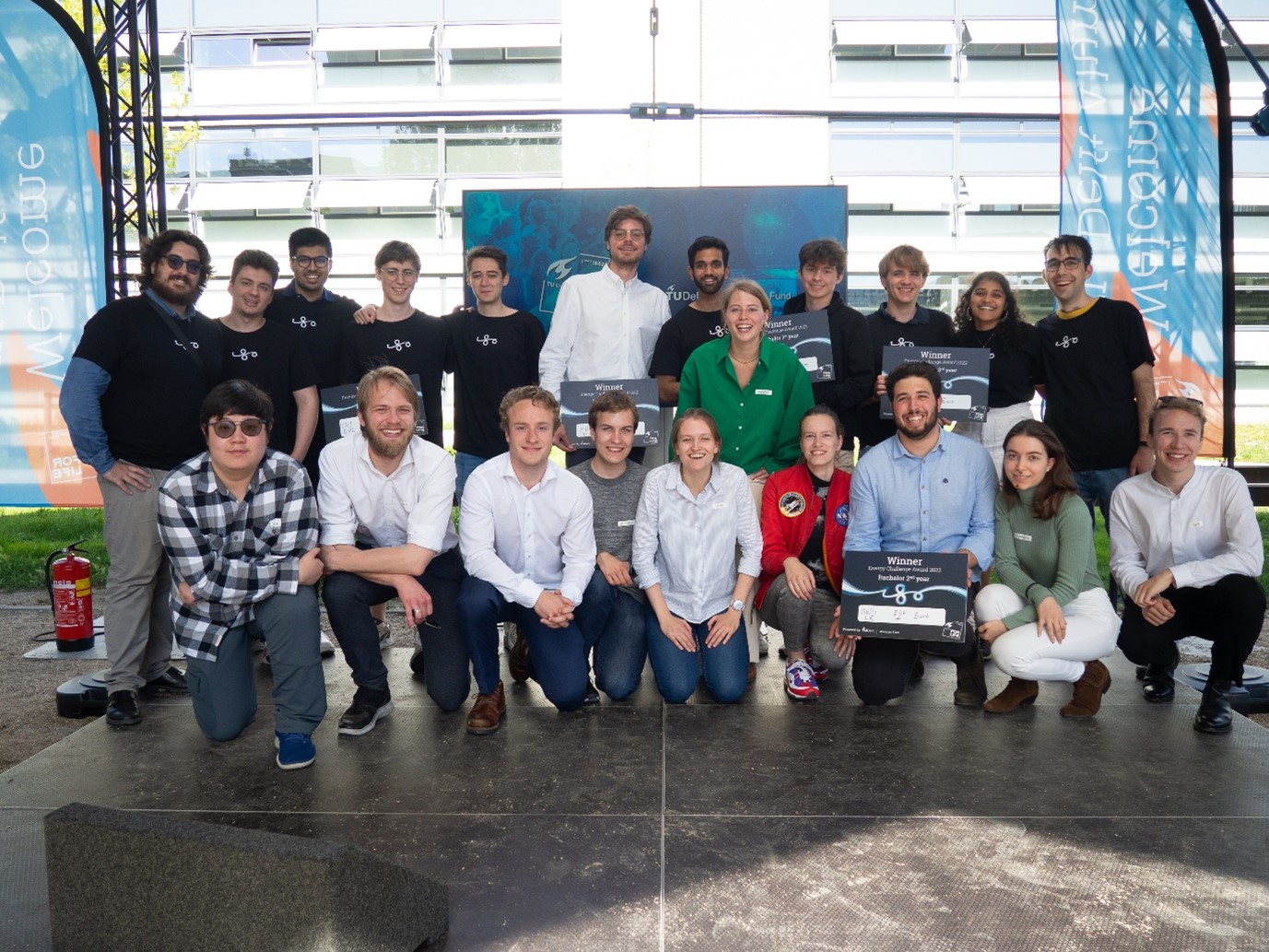
Energy Consumption Game
How do we make people aware of their energy consumption? Awareness of energy use is key and we often have no idea how much energy we use during ordinary day-to-day activities. 78 project teams of 6 students from Computer Science and Engineering worked on software systems to find a way to know more about our own energy usage. The group consisting of Alexandru Cojocaru, Paul Misterka, David Dinucu-Jiany, Giacomo Pezzali, Aakanksh Singh, and Rok Štular amazed their teachers and the jury with their creativity. They designed a game which was fun to play, very educational and simple to use while being very interactive and easy to play with others.
Facts or Fake
As with the awareness of how much energy we consume, there is also a big challenge in the information we obtain via social media and news. Is the information we get a fact or fake? Learning our students to confirm or debunk claims made in popular media outlets about the energy transition can help us to collectively agree, and accelerate action.
Kerim Dzhumageldyev and Krishnan Kandiyoor, 2nd year Bachelor Electrical Engineering students and the winners of the Energy Challenge Award, did a comprehensive fact check on a fictive airport in India taking into account more than just the obvious. A large-scale building can indeed be power-positive, and the largest media outlets in the region can all agree and inform people about it. But, if the region lacks the infrastructure to share the overproduced sustainable energy with the region, the concept of power positivity is already less impactful. These students saw that, and with their analysis, they took that into account, enabling them to really find a path towards sustainability in the region.
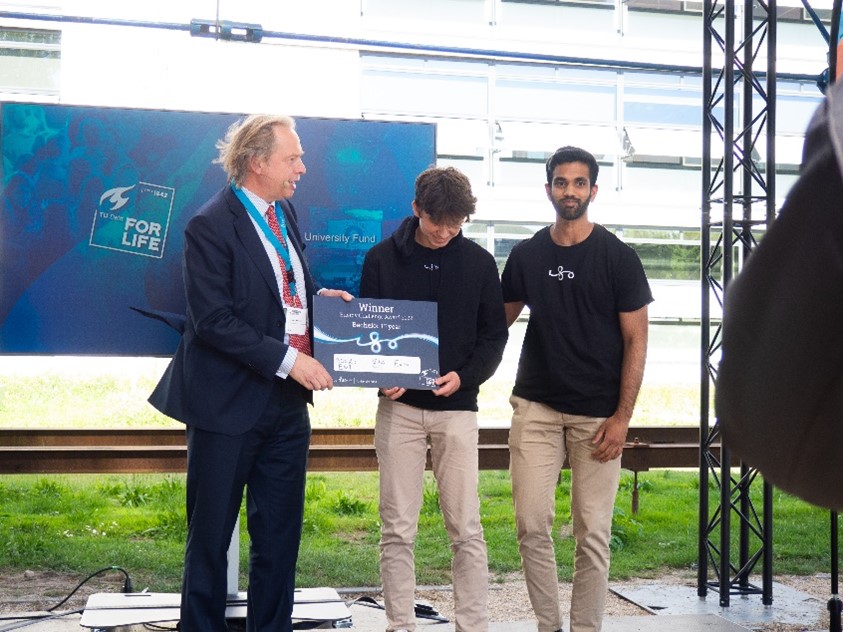
A bridge too far, or a great, creative and progressive concept?
We are driving around with electric cars, and are looking into making our houses more sustainable by using solar panels for electricity, and heat pumps for warmth. Yet, we are still flying towards our holiday destinations in aeroplanes flying on kerosine, polluting the global environment and saturating the air with Ultra Fine Particles (UFP). Giorgio Balbo, Lisa Blom, Jelle Kok, Constança Miranda de Andrade Veiga, Christoph Pabsch, Igor Pszczolkowski, Luke Shu, Annemijn Stokman, Jennifer Thornton, and Guillermo Van (all Aerospace Engineering students) worked on a new hybrid aircraft concept which does not emit UFP’s around the airports, and significantly reduce overall greenhouse gas emissions.
A whole set of suggested updates resulted in their Low Emission Alternative Fuel (LEAF) Concept. The group was praised for their holistic approach to making aviation more sustainable. According to the jury, any plane builder would consider the proposed solutions a bridge too far, but nevertheless, it was well thought through. Maybe concepts like these are unrealistic today, but they might shape the future.
Floating Offshore Wind Energy
We are building larger and larger wind turbines on our seas. Nowadays these structures are directly mounted on the seabed, resulting in huge costs in deeper waters. Typically beyond 50 metres depth, an attractive option is to place the wind turbine on a floating support structure that is moored to the seabed. Working with technology like this widens the opportunities.
Sowmya Iyer, Carlos Pérez Moreno, Daan Koetzier, and Sebastiaan van Putten (Aerospace Engineering students) made a comprehensive and elaborate design for these floating turbines, also highlighting possible additional improvements, in which the group went way beyond their own background. We congratulate them with the Energy Challenge Award 2022 focused on the first year of the master’s.
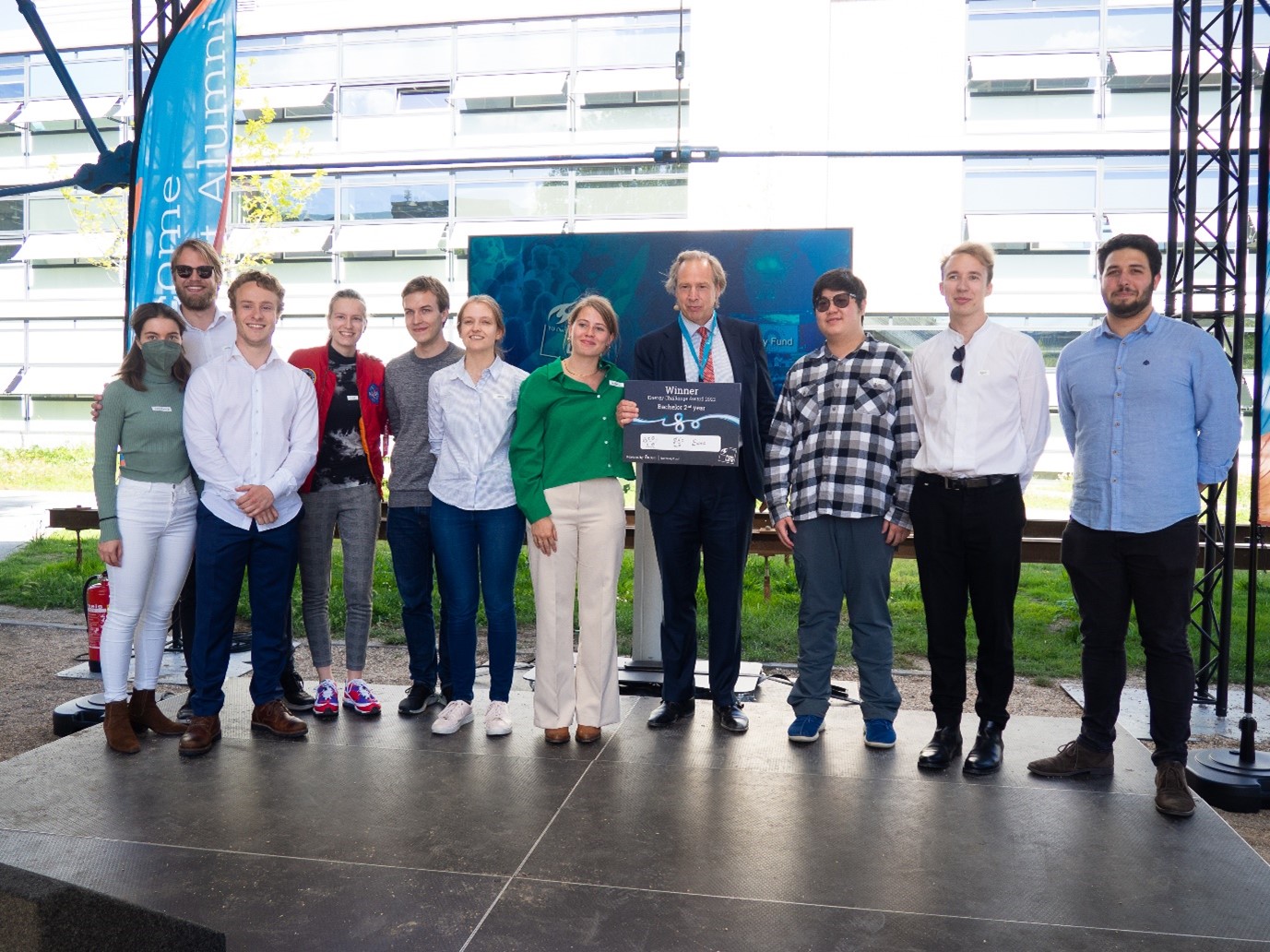
System integration of a high-pressure alkaline electrolyser
From offshore wind energy towards methanol as a versatile energy carrier. Bart Boons recently graduated from the Mechanical, Maritime and Materials Engineering faculty. His master thesis was focused on a new control strategy for the sustainable conversion of carbon dioxide and water into methanol. “He has proposed the method and set up a model, done dynamic simulations for the system behaviour, and done validation experiments by physically building the system and testing it on an existing electrolyser. The results are promising and show that the proposed model may indeed improve system performance” says René Delfos, Director of Studies MSc. Mechanical Engineering. We congratulate Bart on his contribution to accelerating the energy transition.
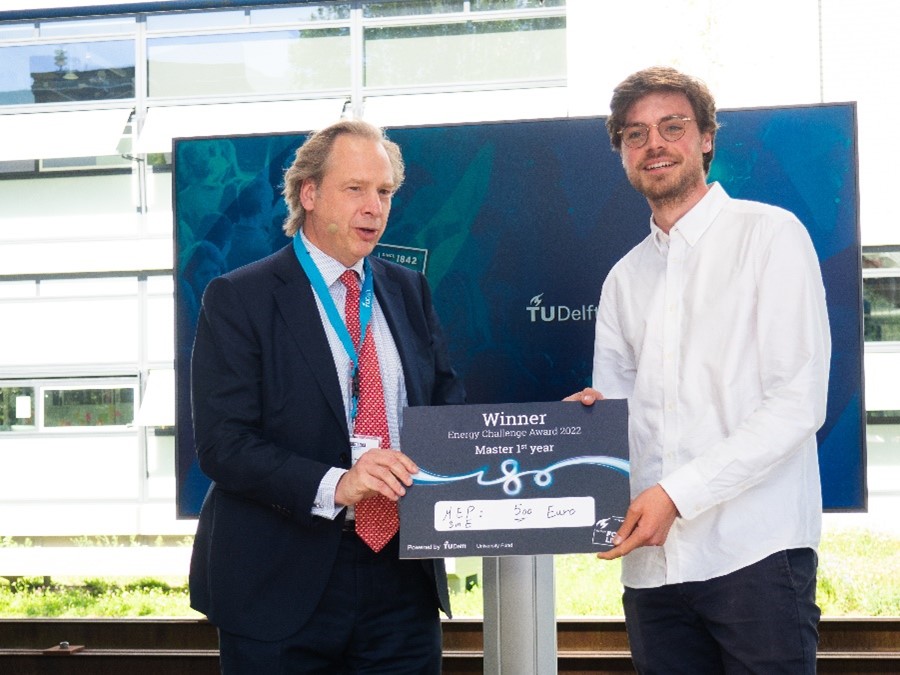
Design for energy extraction and storage from waves
By 2050, the energy supply in the Netherlands will have to be almost entirely sustainable. In addition to energy extraction from natural sources, energy storage is still a major challenge. Is there a technical solution for simultaneous extraction and storage? More than 500 first-year students from TU Delft’s Mechanical Engineering programme worked for six months on a wave energy accumulator, which converts the energy from the movement of waves into the rotational energy of a flywheel.
For those who wave climate change away: burying your head in the sand won’t be possible anymore if the water rises. Our ocean delivers waves of energy, so let you be the one that rises and let the next wave be your solution.
Niek Verhoeven, one of the winners of the Mechanical Engineering Design Competition 2022
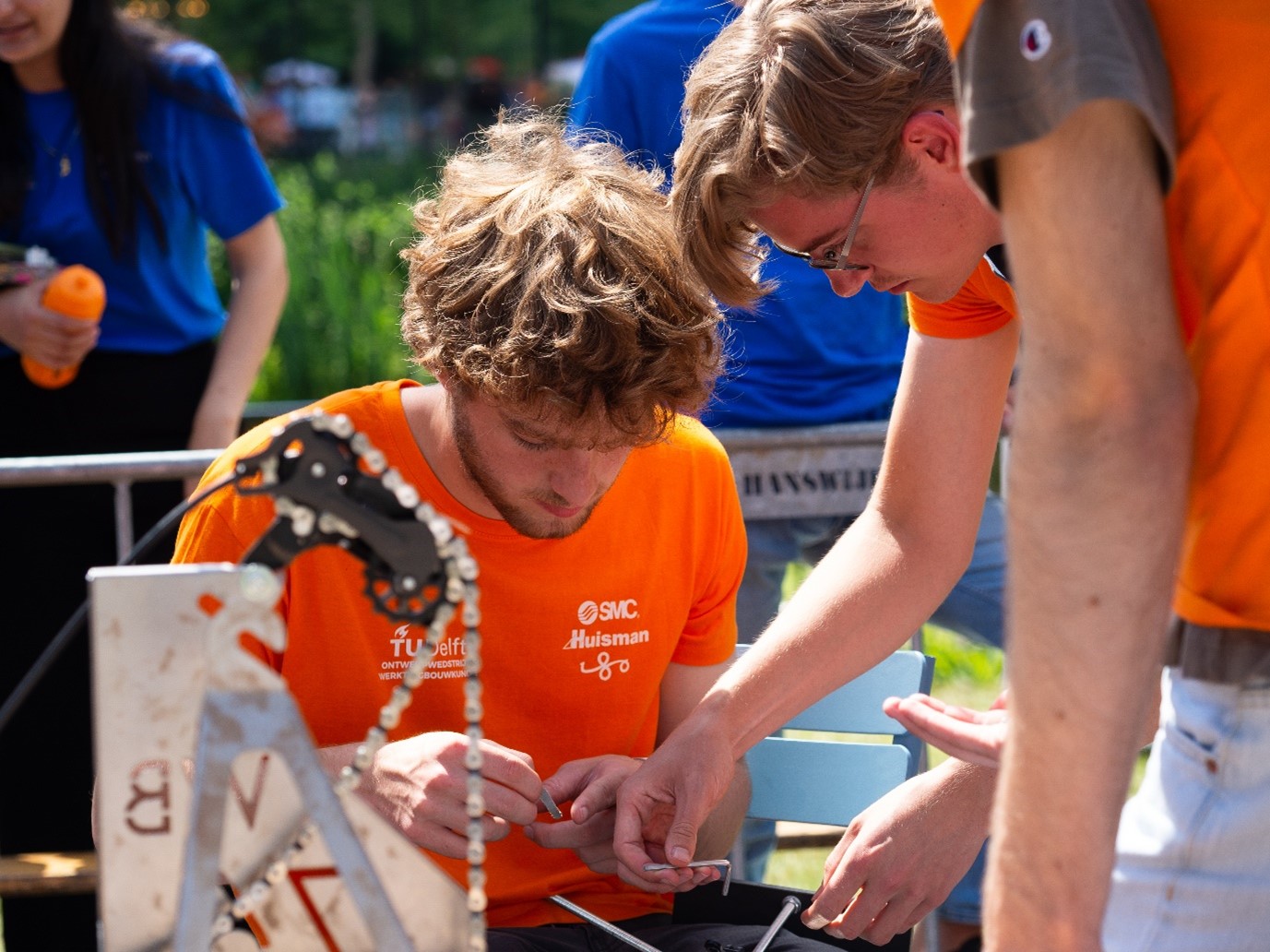
Accelerate, Accelerate, Accelerate
As Kornelis Blok mentioned in his lunch lecture, acceleration is the underlying theme. In order to successfully fight climate change and limit it from becoming worse, speeding up the energy transition is essential. Our TU Delft community, including a variety of alumni who were also present, are working hard to move toward a more sustainable society. We thank the Delft University Fund for making the prizes available for our ambitious students, and we are looking forward to seeing the results of the continuation of their work.
Read more about the event, or watch the after-movie, here.